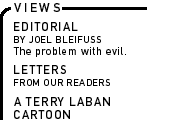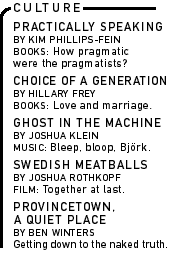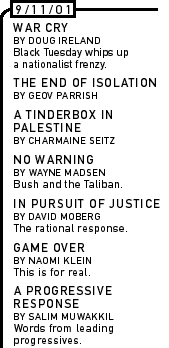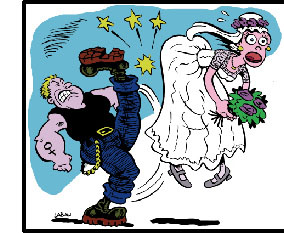|
|

|

|

|
|
|
| |
|
|
|
Here Comes the Bride Young Wives' Tales Listen: If you're a feminist and you're married, or about to get married, or if you've ever thought about getting married, or even if you simply respect the choice to be married, stay away from Here Comes the Bride: Women, Weddings and the Marriage Mystique. Self-proclaimed "spinster-for-life" Jaclyn Geller has written a book that will only piss you off. Here's what Geller, a graduate student in English, says in the opening of her book: "To achieve real social equity women ... must dispense with the stories they tell themselves about wedlock: fairy tales about personal choice, unique, private love, individualism, and self expression. We must stop repeating the absurd mantra 'It's okay to be single,' and adopt the more aggressive stance that 'it's not okay to be married.' " But eradicating marriage isn't high on any feminist agenda I've come across, and Geller
But one needn't tease Geller to slam her overwrought, shrill, annoying and disappointing book. The tension between feminism and marriage--a very real thing for feminists, especially those of us third-wavers--should not be waved off as nothing. Still, a feminist considering marriage should not be so much worried about betraying the sisterhood, as Geller would like to have it. If she's worried at all, it should be over the possibility of betraying herself. Here's the question: Are marriage and feminism compatible? Geller says no way. In her opinion, rejecting marriage is the political act that today's young feminists should be concentrating on; she hopes with her book to "dissuade many would-be wives from draping themselves in white and walking down the aisle." (Note: It's no better if you wear pink, purple or plaid; Geller unleashes her worst venom on those who attempt to have a "quirky" wedding.) Viewing marriage as "a political arrangement that merits a political critique," Geller promises a political dissection of the institution, one that will expose marriage as a real conspiracy, cooked up and maintained to keep women down. Here Comes the Bride falls way short of that goal. Instead of bolstering a feminist argument against marriage with facts, stats or testimony, Geller focuses on how weddings have become a kind of spectator sport: packed with people, exclusive and expensive. No doubt she's right, and for a while her disgust for the privileged union is pretty gripping. But as it stretched over 426 pages, I felt I was being beaten into submission. It's a shame, not only because the book gives you one whopper of a headache, but because there are better critiques about marriage's past, present and future in this country to be made. For instance, Geller barely touches on how inextricably marriage is woven into the fabric of the Constitution and nearly every component of our government (as historian Nancy Cott does clearly, evenly, and thoroughly with Public Vows: A History of Marriage and the Nation)--the shocking truths of which could have won her some converts. Neither does she give more than a cursory nod to those thinkers--St. Augustine, Francis Bacon, Mary Astell, William Godwin and Mary Daly--who she claims "inform her analysis." Instead she bitterly close-reads bridal magazines, Cosmopolitan and various wedding planners available at Barnes and Noble; recounts episodes of Sex and the City and Ally McBeal; and cites celebrity ceremonies profiled in InStyle. At one point she goes "undercover" to a huge bridal shop in Brooklyn and pretends to be a bride in search of a gown. In another episode, she's off to Bloomingdale's to "fake" register for a china pattern. She claims that the wedding reception, where "couple fascism" is "nowhere so powerful," is merely a tool to thrust " 'single' people together in a minimarriage market"; the honeymoon destination is "a place where [the couple] can copulate day and night without fear of interruption." In closing, she scrutinizes films like Betsy's Wedding, which exalts the wedding as a vehicle for self expression, and American Beauty--which exposes marriage for what Geller thinks it really is: a sexually boring union that will turn you into a control-freak shrew and your husband into a pedophile. Sound silly? In a lot of ways it's beyond that. For one thing, marriages and weddings are two separate things--both entail a lot of work, but one results in a huge party. By critiquing both simultaneously, Geller loses her focus. We need a political analysis of marriage from a strong feminist point of view, but we don't need a book that condescends and spends so much time analyzing wedding propaganda we'd never take seriously anyway. Geller doesn't seem to realize that, by focusing on the very propaganda she so hates instead of talking to real brides, she undermines her own arguments. Sure, the magazines, TV shows, films and books that Geller spends so much time combing through do have some sort of unconscious effect on all of us. But that effect is not the thing that makes so many people want a lifelong commitment and a big party to kick it off. I am not defending the white wedding, or the multibillion-dollar industry attached to it. Or engagement rings, which I find just as terrifying as Geller does. Or flatware registries, disco DJs, garter rituals, bachelorette parties or bouquet tossing. Geller explains that her world would be a society in which "no single model of relationship would enjoy privileged status," where everyone enjoyed the same legal protections. Something I think many others--married, single, straight, gay, bi, whatever--would agree on. But it remains unclear how calling on feminists to boycott an institution that some people really do want to join--for intensely personal reasons--would further this political goal. And, anyway, as Geller herself concedes, marriage today is hardly what it was when our mothers got hitched. For proof, take a look at the essays in Young Wives' Tales: New Adventures in Love and Partnership. "Many young feminists want the love, support and companionship that come with long-term commitment, but we don't necessarily want the rigid gender roles, strict monogamy or 'settling down' that have traditionally defined it," note editors Jill Corral and Lisa Miya-Jervis in their introduction to the collection. The contributors have approached the idea of lifelong monogamy and the institution of marriage with a healthy dose of skepticism, though many have found ways to adapt the institution to their needs and desires. The actual relationship responsibilities the various couples (or, in one case, a threesome) have worked out are not so shocking or unconventional by today's standards; splitting up household matters like cooking, cleaning and childcare are hardly novel ideas. But these essays are valuable because of their intensely personal nature; each one is a well-rendered, at times moving, confession. These women describe how they've balanced serious long-distance relationships with serious career moves (and, obviously, writing); designed wedding ceremonies that incorporate religious traditions with funk; decided to make commitments after adulthoods of bisexuality; or let another person into their lives after a long spell of singlehood. The tensions described are fresh. Indeed, unlike the relationship-advice garbage that Geller spends so much time acidly respewing, these essays address real problems and questions that a lot of people--men and women, gay and lesbian, feminist and not--have concerning commitment. Marriage was historically first and foremost a contract--hardly the expression of emotional commitment and love that it is supposed to represent today. More often than not, it was an agreement between a man and a woman's family that stripped the bride of rights, locked her into a relationship from which there is no escape, deprived her of property and wealth and generally stifled her development. But it isn't anymore. And wedding ceremonies--especially those involving feminists--are not always the white spectacles that Geller would have you believe them to be. Still, what is undeniable is that marriage, as an institution used
to promote heterosexual relationships between men and women, is
unfair to all those who don't fall under its purview, who are ineligible
for its legal benefits. But is calling on feminists to boycott marriage
the most efficient way to change this? Geller doesn't convince me.
And if anything, the essays in Young Wives' Tales assure
me that it's not. Don't we want a world with more choices? That
has to be better than one with less. Hillary Frey is assistant literary editor of The Nation.
|






